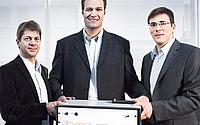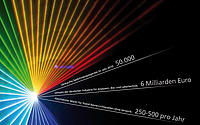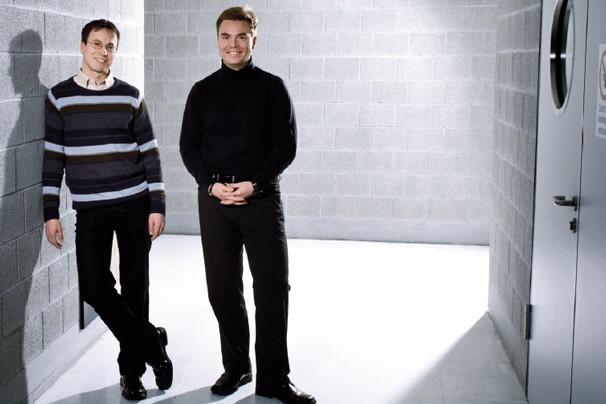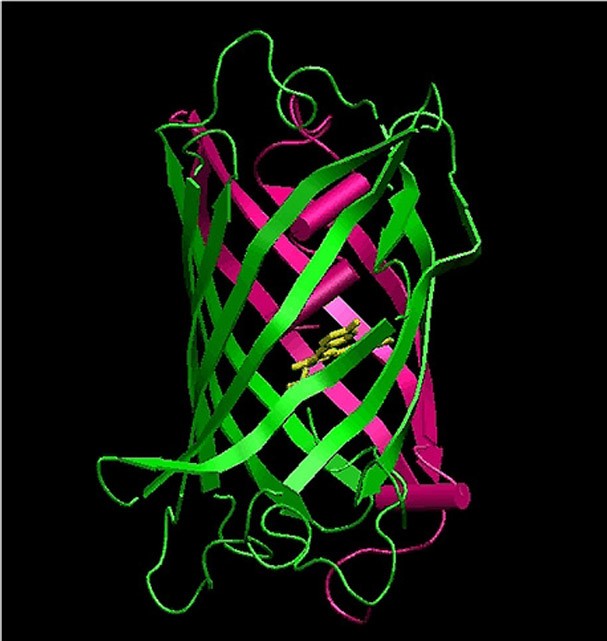The urge to create something new unites science and art. To become entrepreneurs, scientists have to be artists to a certain extent - like a good band; they combine their skills with creativity and passion. Three founders manifested their courage to be free spirits in a KIT spin-off in 2011: VISOLAS GmbH wants to conquer laboratories with its organic laser light source.
On a piano with its 88 keys, a pianist plays pieces of music that are far more than the sum of the individual notes. Countless key combinations allow 309,485,009,821,345,068,724,781,055 variations. The VISOLAS technology works in a similar way to the striking of the keys. What is the striking finger when playing music, is here a laser source - the keyboard becomes a micro grid. By mechanically shifting the microgrid, colored light generate in all possible wavelengths. The technology becomes a product by combining the individual components into a handy device: laser light sources generate colored light for spectroscopy and are an integral part of laboratory analysis technology all over the world. While common color lasers fill the space of half a garage, the VISOLAS founders are developing devices the size of a record player.
"We are not a casting band," say Thomas Woggon, Peter Greiner and Johannes Barth. They form the core team of the young company and have gone through an intensive finding process. What started with physicist Woggon as a PhD project at KIT quickly identified among colleagues as a potential venture - finding the core team, however, was more difficult than expected: "At first, we wanted a big band, but then we just started with a classic rock 'n' roll lineup.
"Founding has a lot to do with playfulness. You have to want to solve problems and not lose sight of the bigger picture."
What distinguishes a founder from a researcher? "While the researcher wants to think further ahead than anyone ever has before, founders want to create something new that will be used practically," explains Peter Greiner, who supports the technology team as a business economist with strong industrial experience. Together with microsystems technician Johannes Barth, they have become familiar with each other in the course of product development and agree that a good band gets better and better by constantly playing together.
The Beatles played their first gigs at Hamburg's Star Club, Bob Dylan practiced in the coffeehouses of Greenwich Village until the big breakthrough came. No creative process can do without development and failure; this is no different for a high-tech company. The VISOLAS rehearsal room is the KIT high-tech incubator, a 'founder's house' based on the international model, in which spin-offs can take their first steps with infrastructural support from the research institution.
For Johannes Barth, discipline and lifelong learning are part of the basic equipment of a founder's character: "We had to practice, practice and practice." Whether team building, product development, customer acquisition, nothing works perfectly from the start. "You come back from your first trade show and know the bulk of the work is still waiting for you." Despite good contacts in the business community and dynamic exchanges about product and market from the start, the gap between science and business, technology and product is large. Bridging that innovation gap can be backbreaking work. Woggon and Barth tinkered for a year and a half to turn the lab prototype into a marketable product.
"Working every day on something you believe in and watching it grow is worth the risk as a company founder."
Lesson learned: successful startups are those that have staying power, can manage and understand how to define their product. Research results are not at a stage of development that is interesting for potential customers, even in the engineering field. "A technology is like a sound system. Knowing a scale of notes does not make a melody but the customer wants a song", says Peter Greiner.
"The strongest motivation is to work in a self-determined way and have fun doing it."
If the organic, tunable laser called 'VISOLAS do' were a song, the combination of technology, team and vision would correspond to the matching orchestra. Without good reviews no commitments - without funding no company foundation. VISOLAS not only attracted Helmholtz Enterprise Funds and EXIST funding but also won the Cyberone special prize for the best research commercialization of the state of Baden-Wuerttemberg in June 2011, beating 61 competitors. The basis for success is the successful combination of creativity and business management.
KIT is involved in VISOLAS, as are scientists who did not join the company but helped develop the technology. The largest share, however, hold the founders themselves. "We have found a gap in the market and believe that we will set international standards and be successful in this niche," says Peter Greiner.
True to the theory that every innovation arises from the destruction of time-honored things, progressive novelties are putting the public on its guard. They challenge it to rethink the tried and tested and to examine it critically. As a high-tech start-up, VISOLAS must convince its audience customer that not only individual technological parameters of the product are better than the state of the art. When it goes into the labs, the innovative overall package is what counts: small size, mobile, easy and fast to operate, powerful, toxin-free, maintenance-extensive and affordable. Thus, VISOLAS beats the direct competitor products and the market for robust spectroscopy instruments is growing.
The first devices are already in use. They are mainly used in analytical laboratories at research institutes and universities. In the future, 'VISOLAS do' and its successors might be used in drug development, blood diagnostics and cancer research, among other applications.
VISOLAS IN BRIEF
KIT spin-off VISOLAS GmbH was founded in 2011. The founding team develops and markets organic lasers for the generation of noise-free and spectrally pure light. With its product, VISOLAS addresses manufacturers in the field of spectroscopy, companies in the field of analytical technology, and scientific research institutions with corresponding laboratory needs. The company was founded as result of a collaboration between Institute of Light Technology and Institute of Microstructure Technology. The founding team consists of Peter Greiner, Thomas Woggon, Ph.D., and Johannes Barth, Ph.D.
Further Links:
Pictures: KIT





